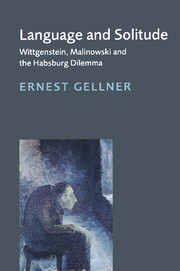Book contents
- Frontmatter
- Contents
- Preface
- Foreword
- Part I The Habsburg dilemma
- Part II Wittgenstein
- 10 The loneliness of the long-distance empiricist
- 11 The poem to solitude, or: confessions of a transcendental ego who is also a Viennese Jew
- 12 Ego and language
- 13 The world as solitary vice
- 14 The mystical
- 15 The central proposition of the Tractatus: world without culture
- 16 Wittgenstein mark 2
- 17 Tertium non datur
- 18 Joint escape
- 19 Janik and Toulmin: a critique
- 20 The case of the disappearing self
- 21 Pariah communalism
- 22 Iron cage Kafka-style
- Part III Malinowski
- Part IV Influences
- Part V Conclusions
- General bibliography
- Bibliographies of Ernest Gellner's writings on Wittgenstein, Malinowski, and nationalism
- Index
15 - The central proposition of the Tractatus: world without culture
Published online by Cambridge University Press: 05 March 2010
- Frontmatter
- Contents
- Preface
- Foreword
- Part I The Habsburg dilemma
- Part II Wittgenstein
- 10 The loneliness of the long-distance empiricist
- 11 The poem to solitude, or: confessions of a transcendental ego who is also a Viennese Jew
- 12 Ego and language
- 13 The world as solitary vice
- 14 The mystical
- 15 The central proposition of the Tractatus: world without culture
- 16 Wittgenstein mark 2
- 17 Tertium non datur
- 18 Joint escape
- 19 Janik and Toulmin: a critique
- 20 The case of the disappearing self
- 21 Pariah communalism
- 22 Iron cage Kafka-style
- Part III Malinowski
- Part IV Influences
- Part V Conclusions
- General bibliography
- Bibliographies of Ernest Gellner's writings on Wittgenstein, Malinowski, and nationalism
- Index
Summary
The Tractatus is so arranged as to consist of a mere seven, fairly short, propositions. The actual book is, of course, somewhat longer as there are sub-propositions intended to illuminate the seven pillars of wisdom by filling in the detail. This, as it were, interstitial material is allocated decimal numbers, so that proximity of the number to a full numeral in theory indicates its closeness to the mainstream of the argument: the more decimal places, the further away a sentence is from the trunk, as it were. This, at any rate, was the intention of the author: in fact it seems to me that on occasion some decimally low, upstart propositions are more important or interesting than some hierarchically, numerically senior ones. Some of these low-decimal parvenus will be considered in detail.
But the point to be made here is another one: the book might well be summed up not in seven, but in one single proposition. What would it be?
There is no such thing as culture.
What the book in effect does is to explore, in a formal and a priori way, the relationship between a single mind and its world. It also says, as we have stressed, that this relationship is the same for all minds. Its central features are predetermined by the very conditions of the encounter between any mind and its data, or a world constructed, or rather just accumulated, from its data.
- Type
- Chapter
- Information
- Language and SolitudeWittgenstein, Malinowski and the Habsburg Dilemma, pp. 68 - 70Publisher: Cambridge University PressPrint publication year: 1998



